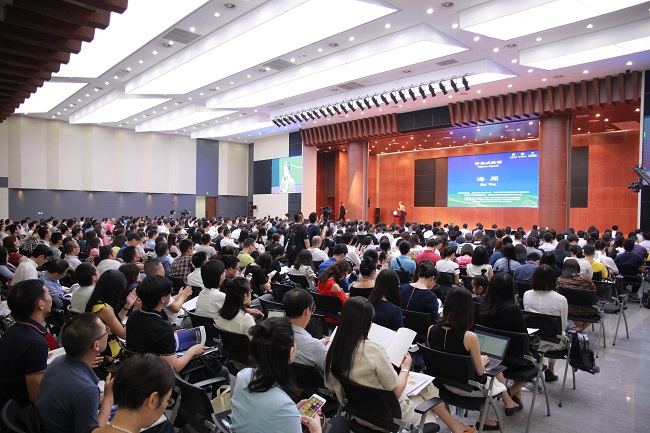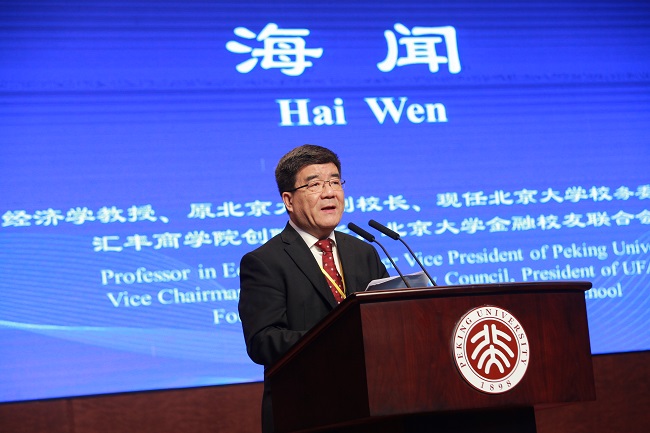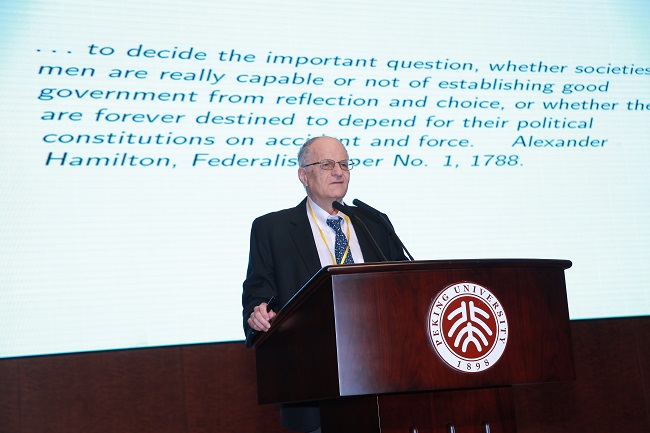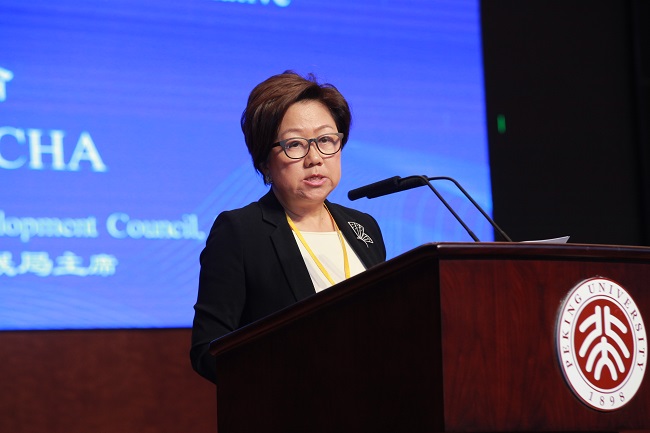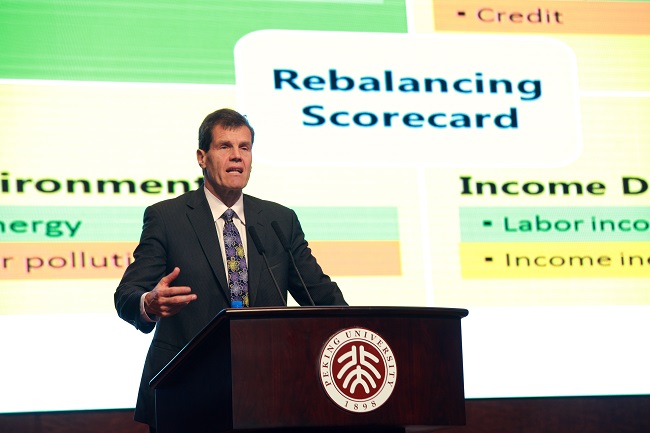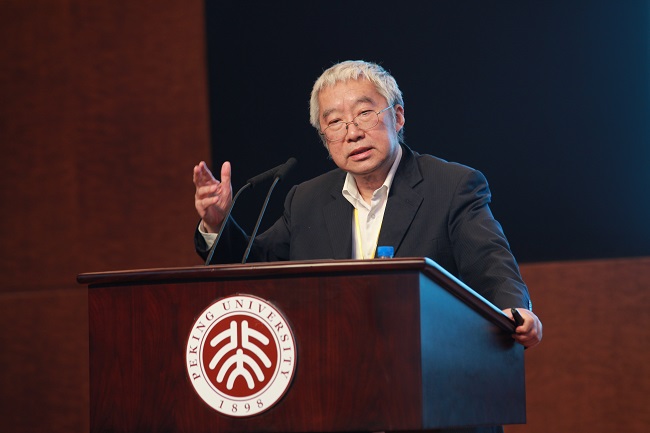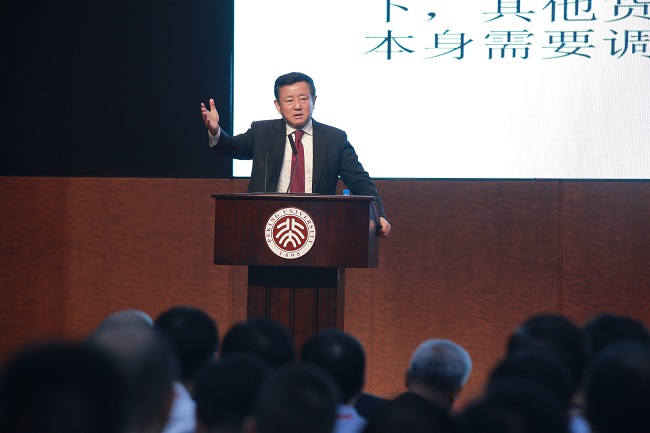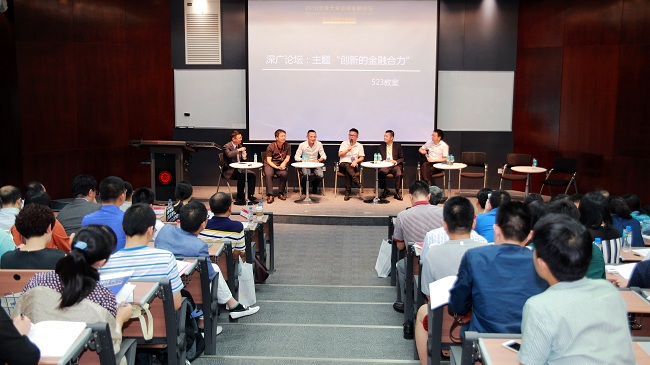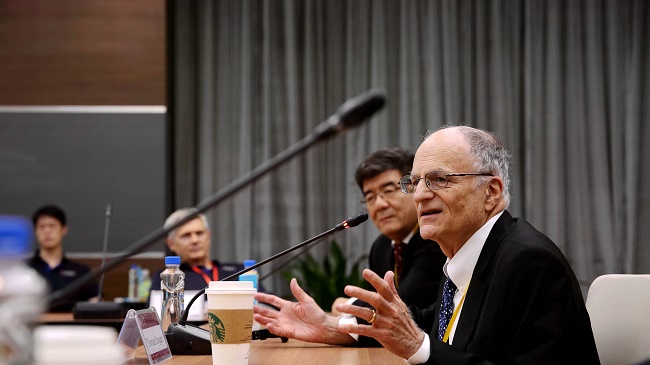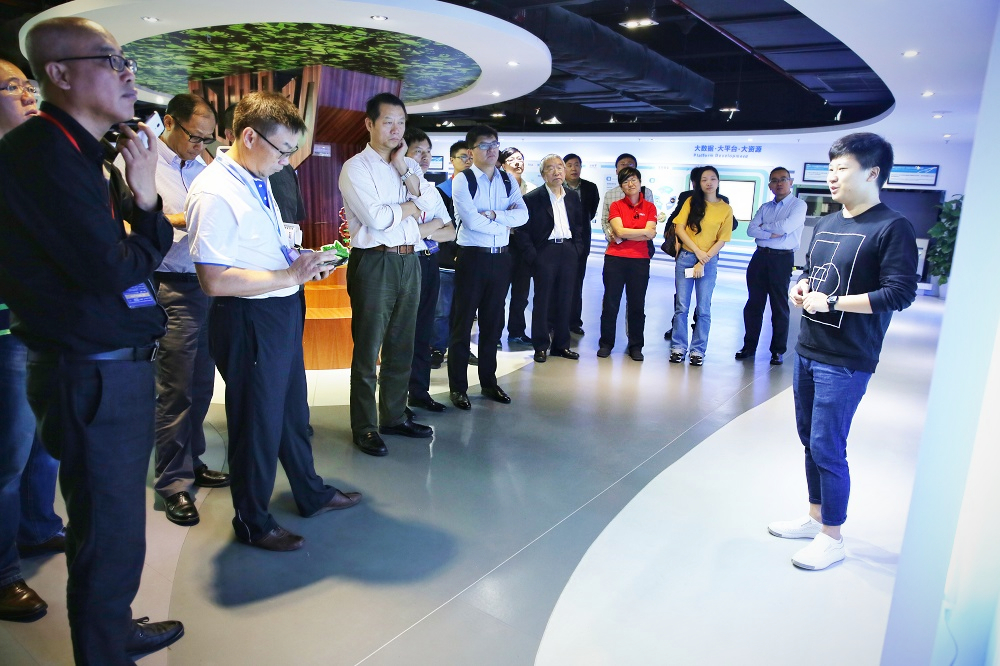As the world’s economy undergoes profound changes, China is confronting economic transition, business model reconstruction, and great downward pressure. On October 1, the International Monetary Fund (IMF) included Chinese renminbi (RMB) in the Special Drawing Rights (SDR) basket. The SDR is an international reserve asset created by the IMF in 1969 to supplement its member countries' official reserves. What kind of opportunities and challenges will RMB internationalization bring to China? How can the Chinese economy better integrate into the international monetary and financial system?
The opening ceremony of the 2016 Peking University Global Financial Forum
In such a context, the 2016 Peking University Global Financial Forum kicked off at Peking University HSBC Business School (PHBS) on October 29 with the theme of “China’s Financial Integration into the World.” Co-hosted by the Union of Finance Alumni of Peking University and PHBS, the annual conference this year featured five keynote speeches, four sub-forums and a dialogue with Nobel Laureate Thomas Sargent. Over 1,000 scholars, policymakers and practitioners worldwide converged to discuss Chinese economic issues, the financial market, and exchange rates, among other topics.
PHBS Dean Hai Wen delivers opening remarks
In opening remarks, PHBS Dean Hai Wen, president of the Union of Finance Alumni of Peking University (PKU), maintained that China’s economy is confronting numerous challenges. He said that he hoped this event could serve as a well-timed opportunity for PKU alumni in the financial sector to contribute through dialogue and discussion to China’s economic reforms and transition.
In the morning session, discussions focused on various topics including China’s financial integration, economic prospects, and exchange rate regime and reform, offering attendees different perspectives on understanding the complex Chinese economy.
Nobel Laureate Thomas Sargent shares his insights about Financial Integration
In his speech
Financial Integration: How to Draw Lines, Thomas Sargent, 2011 Nobel Laureate in economics, shared his thorough analysis on thorny problems confronting today’s global financial development and evolution of international currencies. Sargent held that it is a long-standing issue regarding how to draw lines between monetary policy and fiscal policy, between capital market and credit market, and between the public sector and private sector.
FSDC Chairman Laura Cha gives remarks on the role of Hong Kong in financial market development
Laura Cha, chairman of the Financial Services Development Council (FSDC, Hong Kong), spoke about the role of Hong Kong in the process of RMB capital account convertibility. She held that Hong Kong could play a vital role in facilitating RMB internationalization and financial market development as a global financial center and the largest RMB off-shore hub with its advanced financial infrastructure and substantial human capital.
Markus Rodlauer,deputy director of the IMF Asia-Pacific Division, delivers a keynote speech
Deputy Director of the IMF Asia-Pacific Division Markus Rodlauer shared his insights on China’s economic prospects from a policymaker’s perspective. Based on recent financial data, Rodlauer argued that though China has made noticeable advances in economic and exchange rate reforms, its large credit scale, rapid credit growth and low credit quality have added inevitable vulnerability to its sustainable development.
Professor Yu Yongding shares his view on China's exchange rate system reform
Yu Yongding, fellow of the Chinese Academy of Social Sciences and president of the China Society of World Economics (CSWE), shared his view on China's exchange rate system reform. He thought it was on the right track, making RMB more market-oriented and relatively stable to a basket of currencies. He said that the government should take prudent steps and avoid potential financial turbulence caused by rapid RMB depreciation.
Professor Fan Gang remarks on China's exchange rate regime International Balance of Payment
Fan Gang, PHBS professor and member of the Monetary Policy Committee of the People’s Bank of China, also remarked on this topic and emphasized that China’s enterprises and individuals should change their investment tactics, business models and resource allocation accordingly under the more floating exchange rate regime. He said that meantime, policymakers need to better facilitate RMB internationalization and cope with capital outflows.
A round table discussion at the sub-forum “Innovation in the Financial Market”
Professor Sargent answers questions from faculty and students
Over 60 entrepreneurs, practitioners and policymakers attended the afternoon parallel sub-forums themed, “Investment and Startup in the Capital Winter,” “Wealth Management: China and the World,” “Innovation in the Financial Market,” and “Investment and Financial Management in the Internet Age.” Fu Qiang, TINKTANK CEO; Qing Yifei, executive director of Citic Ding Feng fund; Li Hong, professor of economics at PKU and director of center of national resources and economics studies, and others delivered keynote speeches. Attendees engaged in open discussions on the changes and opportunities in wealth management and the capital market, as well as financial innovation. In the meantime, a dialogue with Nobel Laureate Thomas Sargent offered PHBS faculty and students a chance to further discuss various topics, ranging from China’s economic issues, economic research and macroeconomic study with the renowned economist.
Participants visit BGI on the second day
On the second day of the conference, participants visited BGI. Based in Shenzhen, China’s most innovative city, BGI has become the world’s largest genomics organization with the vision of using genomics to benefit the human race.The visit offered scholars the chance to gain a better understanding about the company and its innovative undertakings.
The Union of Finance Alumni of Peking University, the forum host, was founded in May, 2014 and has 5 professional committees and 11 alumni association chapters worldwide. It holds the annual financial forum to invite well-known alumni, leading practitioners and scholars to share their insights on the financial sector’s policy and development trends to enhance alumni relationships and contribute to China’s financial and economic development.
By Annie Jin
Edited by Priscilla Young





